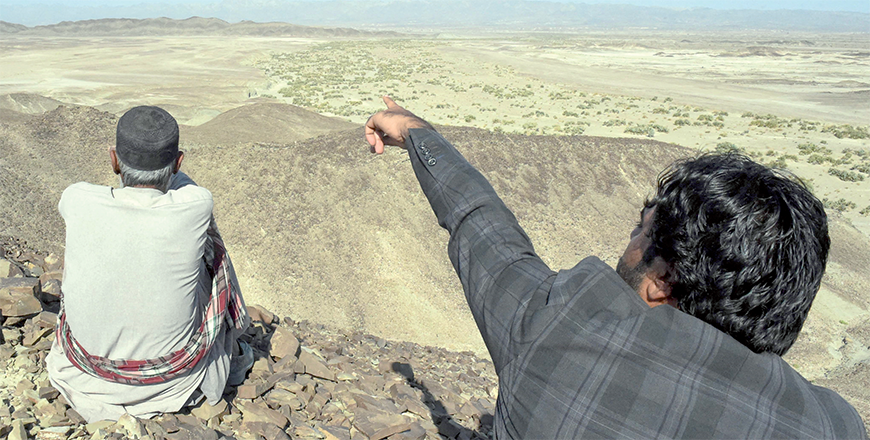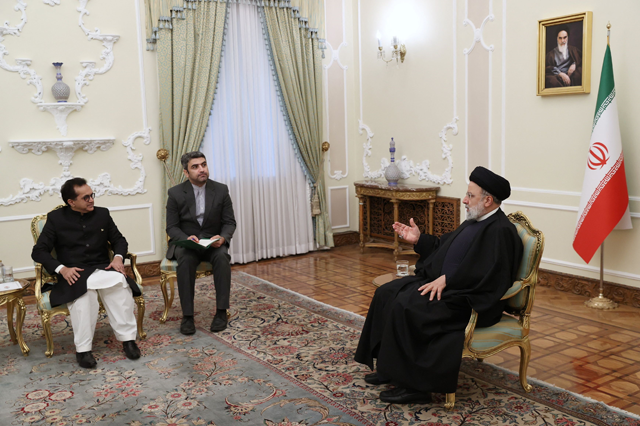You are here
Pakistan hits ‘terrorist hideouts’ in Iran in retaliatory strikes
By AFP - Jan 19,2024 - Last updated at Jan 19,2024

A local resident shows a mountain at the Koh-e-Sabz area of Pakistan’s south-west Baluchistan province where Iran launched an air strike, on Thursday (AFP photo)
TEHRAN — Pakistan launched deadly strikes against militant targets in Iran on Thursday in retaliation for Iranian strikes on its territory, further stoking tensions and prompting Iran to summon Pakistan’s envoy.
At least nine people were killed in the strikes in restive Sistan-Baluchistan province, most of them women or children, Iran’s official IRNA news agency reported.
They came just two days after Iran carried out raids on what it described as “terrorist” targets in Pakistan, killing at least two children.
While Iran and nuclear-armed Pakistan often accuse each other of allowing extremists to operate from the other’s territory, cross-border operations by government forces have been rare.
Pakistan’s foreign ministry described Thursday’s raids as a “series of highly coordinated and specifically targeted precision military strikes against terrorist hideouts” in Sistan-Baluchistan.
The strikes took place at around 4:30am (0100 GMT), with three drones destroying four houses in a village near the city of Saravan, IRNA said, citing Alireza Marhamati, deputy governor of the province.
Iranian media carried images showing severely damaged homes, with one video showing people gathered around a crater.
All those killed were Pakistanis and investigations were under way to determine why they were in the Iranian village, Marhamati said.
The raids targeted Baluch separatists, according to the Pakistani army. The military has been waging a decades-long fight against separatist groups in its sparsely populated border region.
The foreign ministry said the strikes were carried out based on “credible intelligence of impending large-scale terrorist activities”, insisting it “fully respects” Iran’s sovereignty.
Iran condemned the action, and summoned Pakistan’s charge d’affaires “to protest and request an explanation from the Pakistani government”, Foreign Ministry spokesman Nasser Kanani said.
The ministry described Pakistan’s strikes as “unbalanced and unacceptable” and said Iran expects Pakistan “to adhere to its obligations in preventing the establishment of bases and armed terrorist groups in Pakistan”.
Foreign Minister Hossein Amir-Abdollahian has defended Iran’s strikes in Pakistan as a response to recent deadly attacks on the security forces by the extremist group Jaish Al-Adl (Army of Justice).
On Thursday, the ministry underlined that Iran understood that Pakistan’s “friendly and brotherly government is separate from armed terrorists”.
“Iran always adheres to its neighbourly policy and does not allow its enemies and terrorist allies to break these relations,” it said.
Formed in 2012, Jaish Al-Adl has carried out several attacks on Iranian soil in recent years.
Pakistan delivered a strong rebuke to Iran over the strikes, recalling its ambassador from Tehran and blocking Iran’s envoy from returning to Islamabad.
‘Spiral of violence’
China offered to mediate between the neighbouring countries, both close economic partners of Beijing.
The European Union expressed concern about the “spiral of violence in the Middle East and beyond”.
Rising Iran-Pakistan tensions add to multiple crises in the region, with Israel waging a war against Hamas in Gaza and Houthi rebels in Yemen attacking commercial vessels in the Red Sea.
Meanwhile Afghanistan — which borders both Iran and Pakistan, and is home to a small Baluch minority — said the violence between its neighbours was “alarming” and urged them to “exercise restraint”.
On Thursday, Pakistan’s foreign ministry said Prime Minister Anwar-ul-Haq Kakar would cut short his visit to the World Economic Forum in Davos, Switzerland, “in view of the ongoing developments”.
Hours before the strike, Kakar had met the Iranian foreign minister on the sidelines of the forum and posed for photographs.
Earlier this week, IRNA reported that the Iranian and Pakistani navies had carried out joint exercises in the Strait of Hormuz and the Gulf.
Sistan-Baluchistan province is one of the few mainly Sunni Muslim provinces in Shiite-dominated Iran and has seen persistent unrest involving cross-border drug-smuggling gangs and rebels from the Baluchi ethnic minority as well as extremists.
In January, Jaish al-Adl claimed an attack on a police station in the border town of Rask which killed one officer. The group carried out a similar attack in the same town in December which killed 11 police officers.
On Wednesday, the group said it had killed a member of Iran’s Revolutionary Guards in Sistan-Baluchistan, IRNA reported.
Related Articles
TEHRAN — Gunmen in south-eastern Iran killed nine people on Saturday, Iranian media reported, with Islamabad's ambassador identifying them a
DAVOS, Switzerland — Tehran’s top diplomat said on Wednesday that his country’s armed forces targeted an “Iranian terrorist group” in Pakist
The status of five kidnapped Iranian border guards remains unclear, Iran said on Sunday, retracting earlier reports by Iranian military officials that they had been freed in Pakistan.













